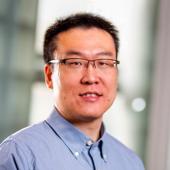
Xiaolei Wang, Ph.D., P.Eng.
Personal Website: https://sites.google.com/view/nanofacelab/home
Contact
Professor, Faculty of Engineering - Chemical and Materials Engineering Dept
- xiaolei.wang@ualberta.ca
- Phone
- (780) 492-7164
- Address
-
12-241 Donadeo Innovation Centre For Engineering
9211 116 StEdmonton ABT6G 2H5
Overview
Area of Study / Keywords
Advanced Energy Materials Nanotechnology and Clean Energy Technologies Electrochemistry and Electrocatalysis Batteries and Supercapacitors Battery Recycling and Critical Minerals Canada Research Chair Energy Surface and Interfacial Science
About
Dr. Xiaolei Wang is a Canada Research Chair in Batteries for Sustainability and a full professor of chemical engineering at the University of Alberta. He runs his Nano For Advanced Clean Energy (NanoFACE) laboratory focusing on the rational design, development and application of novel nanostructured materials for energy-related technologies including lithium-ion batteries, sodium-ion batteries, lithium-sulfur (Li-S) batteries, metal-air batteries, supercapacitors, and electrocatalytic systems.
Professional Appointments:
Jul. 2025 – present, Professor in the Department of Chemical and Materials Engineering, University of Alberta
Jul. 2023 – Jun. 2025, Associate Professor in the Department of Chemical and Materials Engineering, University of Alberta
Aug. 2019 – Jun. 2023, Tenure-Track Assistant Professor in the Department of Chemical and Materials Engineering, University of Alberta
Aug. 2017 – Jul. 2019, Tenure-Track Assistant Professor in the Department of Chemical and Materials Engineering, Concordia University
Nov. 2013 – Jul. 2017, Postdoctoral Fellow Researcher in the Department of Chemical Engineering, University of Waterloo
Education:
Sep. 2007 – Jun. 2013 Ph.D. in Chemical and Biomolecular Engineering, University of California, Los Angeles (UCLA), United States
Sep. 2004 – Mar. 2007 M.S. in Chemical Engineering, Tianjin University, P.R. China
Sep. 2000 – Jul. 2004 B.S. in Polymer Chemical Engineering, Dalian University of Technology, P.R. China
Research
Dr. Xiaolei Wang's NanoFACE research laboratory is interested in nanotechnology and clean energy technologies. The research themes centre upon the design, development and application of novel nanostructured materials for energy-related technologies including lithium-ion batteries, aqueous zinc-ion batteries, lithium-sulfur (Li-S) batteries, sodium (and other alkaline)-ion batteries, and electrocatalytic system such as metal-air batteries, water electrolyzer, fuel cells, and systems for electrochemical CO2 reduction. We build upon our knowledge from the fundamental studies and understanding of mechanisms by correlating the electrochemical performance of clean energy technologies with materials' morphologies and microstructures, aiming to develop next-generation high-performance clean energy technologies for practical applications.
Rational Design and Development of Nanoarchitectured Materials
- Nanostructured Metal, Transition Metal Oxides/Sulfides/Nitrides/phosphides, Composite Materials
- Porous Materials, Self-Assembly
- Nanostructured Semiconductors, Quantum Dots/Wires
- Polymers and Polymer Composites; Carbon Materials
Clean Energy Technologies
- Electrochemical Energy Storage: Aqueous Zinc-Ion Batteries and Supercapacitors, Lithium-ion Batteries and Supercapacitors, Lithium-Sulfur Batteries, Sodium-ion Batteries, Supercapacitors, Multivalent Ion Batteries
- Electrocatalysis: Water Splitting (OER and HER), H2O2 Production (2e- ORR), Fuel Cells (4e- ORR), Metal-Air Batteries (ORR and OER), CO2 Reduction System (CO2RR)
- Photoelectrocatalysis/Electrochromics: CO2 Reduction, Smart Windows
Battery Recycling/Upcycling and Critical Minerals
- Hydrometallurgical Recycling of Critical Mineral Elements
- Transition Metal Elements Leaching and Recycling
- Electrode Materials Recycling and Regeneration
- Electrode Upcycling and Upgrading
Fabrication of Devices
- Coin Cells and Pouch Cells for Batteries and Supercapacitors
- Wearable and Flexible Devices
- All-Solid-State Devices
- Smart Composites/Devices